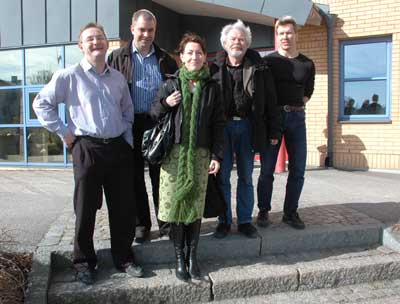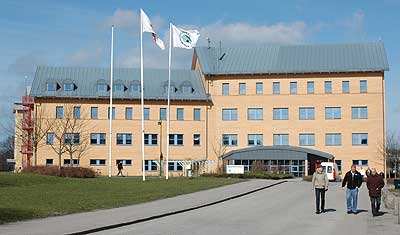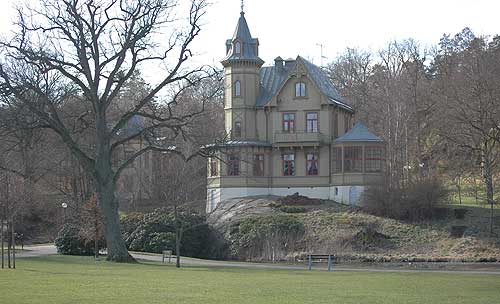SWEDISH SOUTH ASIAN STUDIES NETWORK
SASNET at BTH:
Blekinge Institute of Technology –
a soft corner
of Sweden
The School of Engineering web page: http://www.bth.se/tek
 |
| Jan-Olov Gustavsson, Mikael Åsman, Maria Engelmark, Staffan Lindberg (SASNET) and Lars Lundberg. |
Blekinge Institute of Technology (BTH) is
one of the youngest and smallest universities in Sweden with just
about 3 500 full time students and a staff of about 500.
BTH is spread over 3 campuses at Karlskrona, Ronneby and Karlshamn
and focuses on applied IT technology. It attracts a great many
foreign students in its various programmes.
Located just beside
the Ronneby Brunnspark, named as Sweden's most beautiful garden
in 2005, the Ronneby campus is probably one of the most attractive
university sites in Sweden. It is integrated with the Soft Center
here, which is older than the university itself.
On 14th March,
Lars Eklund and Staffan Lindberg from SASNET, visited the campus
for a discussion of its activities related to South Asia and a
discussion of would SASNET could do for the promotion of its South
Asia activities. They were hosted by Jan-Olof
Gustavsson, Dean,
School of Engineering, Maria
Engelmark, Head of International Office, Prof.
Lars Lundberg from the
Dept. of Computer Systems Engineering, and Mikael Åsman,
Head of Masters Programme in Electrical Engineering.
The sun was
shining, a warm wind kindled our faces, and the Ronneby Brunnspark
garden just about to change into spring costume as we approached
the new building complex that was Soft Center and BTH, and Ekmans
restaurant for lunch.
 Last
year there were about 1 200 foreign students studying at the various
Masters programmes in Technology. They come from 43 different countries,
most of them from South Asia (Pakistan, Bangladesh and India), China
and Nigeria. From 1 September, a new undergraduate 3-year programme
will be launched with 60 students. There are already more than 2 000
applications to this programme alone. To fill the seats, BTH plans
to accept about 300 students, since the drop out rate is very high.
Last
year there were about 1 200 foreign students studying at the various
Masters programmes in Technology. They come from 43 different countries,
most of them from South Asia (Pakistan, Bangladesh and India), China
and Nigeria. From 1 September, a new undergraduate 3-year programme
will be launched with 60 students. There are already more than 2 000
applications to this programme alone. To fill the seats, BTH plans
to accept about 300 students, since the drop out rate is very high.
The following programmes
are offered by BTH at the masters level:
•
Computer Science
•
Electrical
Engineering, with emphasis on Telecommunications/Internet Systems/Signal
Processing/Radio Communications
•
European Masters Course on Software
Engineering
•
Game Artificial Intelligence
•
Informatics
•
Intelligent Software
Systems
•
Mathematical Modelling and Simulation
•
Mechanical Engineering
with emphasis on Structural Mechanics
•
Security Engineering
•
Software Engineering
Strategic Leadership Towards Sustainability
Only about ten per cent of the Masters students come
from Sweden. The dominance of students from Asia and Africa means a
great challenge for BTH. Students have difficulties getting visas,
which is one important reason for non-attendance. They come mostly
on their own finance, which despite the absence of tuition fees, is
a considerable financial commitment on part of their families. However,
this promotes efficient studies and results are very strong in terms
of degrees achieved.
But the students also come from another culture
and with different expectations.
One problem is undue copying in the
sense of cutting from the Internet and pasting in exam papers without
proper references. Students focus on results and don’t always
realise that this is not a business practice but a learning process.
However, by designing very strict instructions and format for the
delivery of exam papers, it seems BTH has overcome most of this
problem.
 Another problem is the cultural encounter with the West
and loss of social control from one’s own home family and
society. A few of the foreign male students make approaches/invitations
that are experienced as embarrassing by female students and teachers.
There is no easy way of dealing with this behaviour as many lone
women travellers have experienced in South Asia, for example. To
counteract this and other problems, including the ones experienced
by students in adjusting to local culture and society, BTH plans
to strengthen the introductory course week in various ways and
also promote social integration of the various student groups.
Another problem is the cultural encounter with the West
and loss of social control from one’s own home family and
society. A few of the foreign male students make approaches/invitations
that are experienced as embarrassing by female students and teachers.
There is no easy way of dealing with this behaviour as many lone
women travellers have experienced in South Asia, for example. To
counteract this and other problems, including the ones experienced
by students in adjusting to local culture and society, BTH plans
to strengthen the introductory course week in various ways and
also promote social integration of the various student groups.
The industry in Blekinge is crying for qualified workers, but foreign students do not get visas to stay on after they have finished their degree, which would be one way of meeting the demands of industry and also benefiting the Swedish economy. Another problem is that the students can not stay to pursue PhD studies, because there are very few scholarships and doctoral positions available, and also because they are not allowed to finance their studies themselves at this level. One suggestion is that the PhD students should be admitted on the premise that they work half time in a local industry and study for the degree on the other half. Maybe this suggestion can be realised when the study length of PhD studies is reduced to 3 years in the future.
So far most of the students have come here as free mover students. BTH has agreed to the controversial suggestion that fees should be introduced for non-European students in the future, and is now developing new strategies to ensure a steady inflow of foreign students in the future. In South Asia, BTH has developed cooperation with three universities in Pakistan (Fatima Jinnah Women’s University in Rawalpindi, the Air University in Islamabad, and Ghulam Ishaq Khan Institute of Engineering Sciences and Technology, GIKI, in Topi, NWFP). Collaboration has also been established with three universities in India – all in the state of Andhra Pradesh. These are Jawaharlal Nehru Technological University in Hyderabad, Andhra University in Visakhapatnam and Sri Venkateswara University in Tirupati. Negotioations are also under way to establish a research collaboration between BTH and the Indian Institute of Technology Madras in Chennai, Tamil Nadu.
With these plans and strategies, one feels confident that BTH is going to develop a sustainable technology university in the future and maybe defend its position as the most internationalised university in Sweden.
SASNET - Swedish South Asian Studies
Network/Lund University
Address: Scheelevägen 15 D, SE-223 70 Lund, Sweden
Phone: +46 46 222 73 40
Webmaster: Lars Eklund
Last updated
2007-07-04
